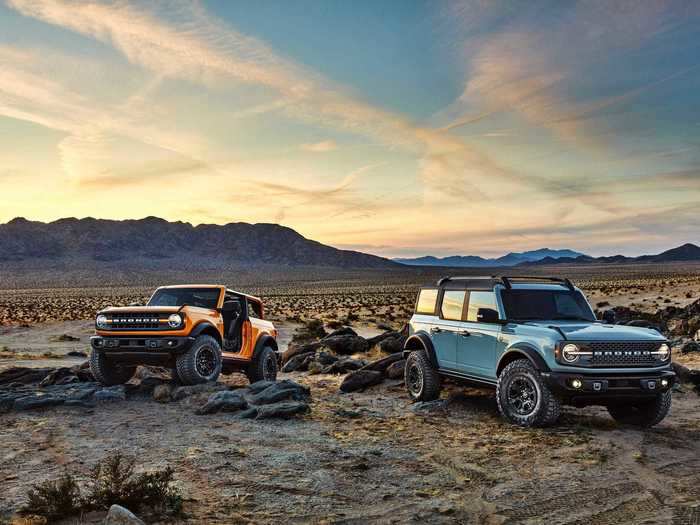
Ford Bronco.Ford
After a handful of delays and a whole lot of fanfare, the hotly-anticipated 2021 Ford Bronco has finally arrived. The new nostalgia-packed model — a trio of models, actually — is the first SUV to bear the Bronco name in more than two decades.
Before it was axed in 1996, the Bronco enjoyed a lengthy, three-plus-decade stint on the market that started in 1965. Initially developed to take on Jeep and other utility vehicles of the time, the Bronco earned a reputation for being equally capable on- and off-road over the course of its first production run. Given that, it's no wonder that Ford decided to revive the Bronco nameplate for its new off-roading brand that — once again — takes aim at Jeep.
Enduring through five model generations, Ford's "go-nearly-everywhere, do-nearly-everything" 4x4 SUV gained icon status, had a brush with infamy, and cemented its spot in American culture.
From the summer of '69 to the O.J. trial, here's a look back at the Bronco's first 31 years on the market.

















Source: Ford
















Source: History









 I spent 2 weeks in India. A highlight was visiting a small mountain town so beautiful it didn't seem real.
I spent 2 weeks in India. A highlight was visiting a small mountain town so beautiful it didn't seem real.  I quit McKinsey after 1.5 years. I was making over $200k but my mental health was shattered.
I quit McKinsey after 1.5 years. I was making over $200k but my mental health was shattered. Some Tesla factory workers realized they were laid off when security scanned their badges and sent them back on shuttles, sources say
Some Tesla factory workers realized they were laid off when security scanned their badges and sent them back on shuttles, sources say 8 Lesser-known places to visit near Nainital
8 Lesser-known places to visit near Nainital
 World Liver Day 2024: 10 Foods that are necessary for a healthy liver
World Liver Day 2024: 10 Foods that are necessary for a healthy liver
 Essential tips for effortlessly renewing your bike insurance policy in 2024
Essential tips for effortlessly renewing your bike insurance policy in 2024

Copyright © 2024. Times Internet Limited. All rights reserved.For reprint rights. Times Syndication Service.